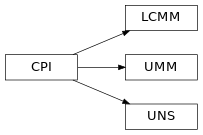5.7. pyopus.problems.lvns — Lukšan-Vlček set of nonsmooth problems¶

Nonsmooth test functions by Lukšan and Vlček (PyOPUS subsystem name: LVNS)
This module is independent of PyOPUS, meaning that it can be taken as is
and used as a module in some other package. It depends only on the cpi
and the _lvns modules.
The code in the binary module shares variables. Therefore the function should be created and then used immediately. Creating another function may change the previously created one. This sucks, but what can you do? I know! Rewrite the FORTRAN code :)
- lvns
Lukšan L., Vlček J.: Test Problems for Nonsmooth Unconstrained and Linearly Constrained Optimization, Technical report V-798, ICS AS CR, Prague, 2000.
-
class
pyopus.problems.lvns.LCMM(name=None, number=None)[source]¶ Linearly constrained minimax problems from the Lukšan-Vlček test suite.
name - problem name
number - problem number (0-14)
Attributes:
name- problem namen- number of variablesm- number of partial functionsnc- number of linear constraintsxl- lower bounds on variablesxh- upper bounds on variablescl- lower bounds on constraint functionsch- upper bounds on constraint functionsJc- Jacobian of constraints, one row per constraintinitial- initial values of variablesfmin- best known minimum
All test functions in this module are maps from \(R^n\) to \(R\). Every function is comprised of m partial functions
\[f_1(x) ... f_m(x)\]where x is a n-dimensional vector.
The actual test function is then constructed as
\[f(x) = \max_{i=1}^m f_i(x) \]or
\[f(x) = \max_{i=1}^m \left| f_i(x) \right|\]The nc constraints are linear and are of the form
\[cl \leq c(x) \leq ch\]Beside linear constraints a problem can also have bounds of the form
\[xl \leq x \leq xh\]-
cpi()[source]¶ Returns the common problem interface.
Gradient is not supported. Anyway it is valid only where the functions are smooth.
xmin is also not available.
See the
CPIclass for more information.
-
fi(x, i=None)[source]¶ Returns the value of the i-th partial function at x. If i is not given a vector of all partial functions is returned.
-
names= ['MAD1', 'MAD2', 'MAD4', 'MAD5', 'PENTAGON', 'MAD6', 'EQUIL', 'Wong2', 'Wong3', 'MAD8', 'BPfilter', 'HS114', 'Dembo3', 'Dembo5', 'Dembo7']¶ List of all function names
-
class
pyopus.problems.lvns.UMM(name=None, number=None)[source]¶ Unconstrained minimax problems from the Lukšan-Vlček test suite.
name - problem name
number - problem number (0-24)
Attributes:
name- problem namen- number of variablesm- number of partial functionsinitial- initial values of variablesfmin- best known minimum
All test functions in this class are maps from \(R^n\) to \(R\). Every function is comprised of m partial functions
\[f_1(x) ... f_m(x)\]where x is a n-dimensional vector.
The actual test function is then constructed as
\[f(x) = \max_{i=1}^m f_i(x) \]or
\[f(x) = \max_{i=1}^m \left| f_i(x) \right|\]-
cpi()[source]¶ Returns the common problem interface.
Gradient is not supported. Anyway it is valid only where the functions are smooth.
xmin is also not available.
See the
CPIclass for more information.
-
fi(x, i=None)[source]¶ Returns the value of the i-th partial function at x. If i is not given a vector of all partial functions is returned.
-
names= ['CB2', 'WF', 'SPIRAL', 'EVD52', 'RosenSuzuki', 'Polak6', 'PBC3', 'Bard', 'KowalikOsborne', 'Davidon2', 'OET5', 'OET6', 'GAMMA', 'EXP', 'PBC1', 'EVD61', 'Transformer', 'Filter', 'Wong1', 'Wong2', 'Wong3', 'Polak2', 'Polak3', 'Watson', 'Osborne2']¶ List of all function names
-
class
pyopus.problems.lvns.UNS(name=None, number=None)[source]¶ Unconstrained nonsmooth problems from the Lukšan-Vlček test suite.
name - problem name
number - problem number (0-24)
Attributes:
name- problem namen- number of variablesinitial- initial values of variablesfmin- best known minimum
All test functions in this module are maps from \(R^n\) to \(R\). Gradients are valid only where the functions are smooth (continuously differentiable).
-
cpi()[source]¶ Returns the common problem interface.
Gradient is not supported because it is untested at this time. Anyway it is valid only where the functions are smooth.
xmin is also not available.
See the
CPIclass for more information.
-
names= ['Rosenbrock', 'Crescent', 'CB2', 'CB3', 'DEM', 'QL', 'LQ', 'Mifflin1', 'Mifflin2', 'Wolfe', 'RosenSuzuki', 'Shor', 'Colville1', 'HS78', 'ElAttar', 'Maxquad', 'Gill', 'Steiner2', 'Maxq', 'Maxl', 'TR48', 'Goffin', 'MXHILB', 'L1HILB', 'ShellDual']¶ List of all function names
Example file lvns.py in folder demo/problems/
# -*- coding: UTF-8 -*-
# Lukšan-Vlček nonsmooth problems test suites
from pyopus.problems.lvns import *
if __name__=='__main__':
print("Unconstrained minimax problems")
for ii in range(len(UMM.names)):
prob=UMM(number=ii)
# These problems need setting up before they are used.
# Only one problem can be uset at a time.
prob.setup()
print("%2d: %20s n=%2d: f0=%e" % (ii, prob.name, prob.n, prob.f(prob.initial)))
print()
print("Unconstrained nonsmooth problems")
for ii in range(len(UNS.names)):
prob=UNS(number=ii)
# These problems need setting up before they are used.
# Only one problem can be uset at a time.
prob.setup()
print("%2d: %20s n=%2d: f0=%e" % (ii, prob.name, prob.n, prob.f(prob.initial)))
print()
print("Linearly constrained minimax problems")
for ii in range(len(LCMM.names)):
prob=LCMM(number=ii)
# These problems need setting up before they are used.
# Only one problem can be uset at a time.
prob.setup()
print("%2d: %20s n=%2d: f0=%e" % (ii, prob.name, prob.n, prob.f(prob.initial)))
print()